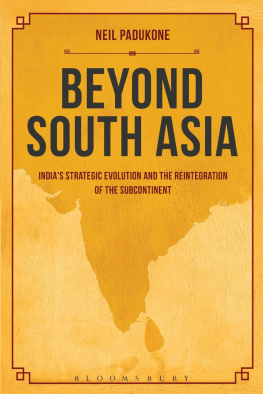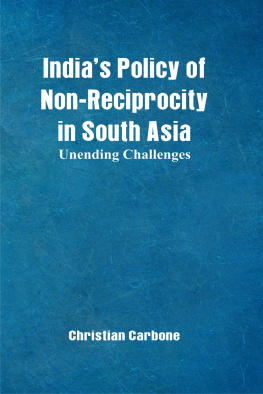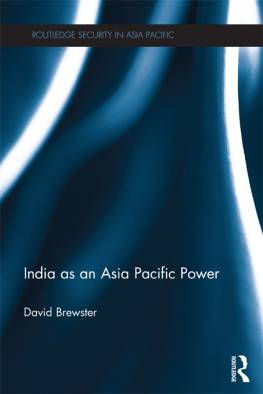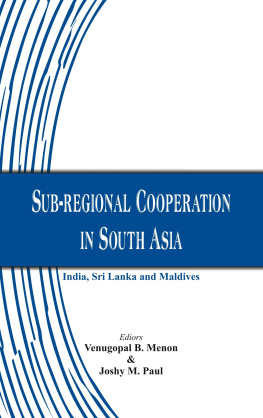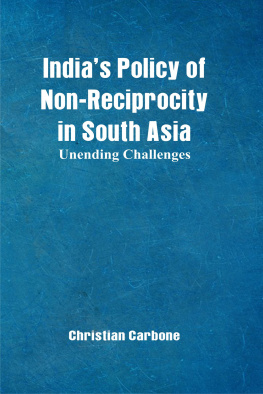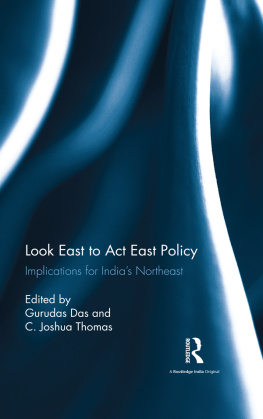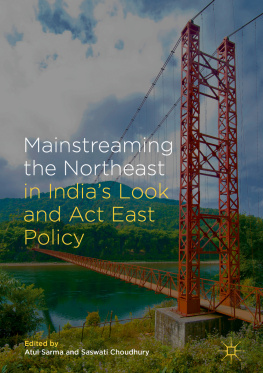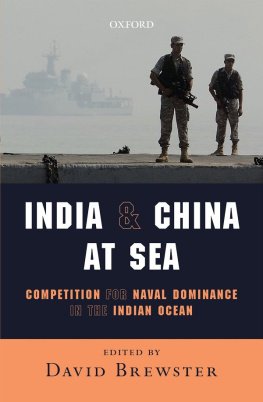I ts become a clich to say that a book would not be possible without a great number of people. But having gone through the process now, its become clear how true that is: ideas, information, the motivation to keep going when youre beset by inertia, andeverything, reallyare a product of the company youre blessed with. And though I take sole responsibility for this work, it truly would not be possible without the kindness and assistance of so many.
Gen. Ved Malik made a generous bet on a young scholar, and deserves the greatest credit for putting the notion of this book into my mind. Brig. Gurmeet Kanwal and Dr Bharat Karnad are two brilliant and pioneering minds of Indian strategic thought that encouraged me from the get-go, and without whom I would have never made it to India in the first place.
Matt Kopel and the team at Bloomsburyincluding insightful anonymous reviewersmade this sometimes daunting journey a certified, and now attained destination. Thank you to all of the generous folks I interviewed, spoke with, read, and heard frommany of whom are cited herein, but many of whom preferred to remain anonymous. The American Center of New Delhi, the Harvard University library system, Google, and especially the New York Public Library made it possible for me to access hundreds of important resources without breaking the bank.
My great appreciation goes to Sunjoy Joshi, Sudheendra Kulkarni, Samir Saran, Lt. Gen. Patankar, Surendra Singh, Saeed Naqvi, Wilson John, Niranjan Sahoo, M. K. Rasgotra, Deba Mohanty, Lydia Powell, Baljit Kapoor, Satish Misra, R. Swaminathan, Dhaval Desai, Nisha Verma, and everyone at the Observer Research Foundation for unfettered access to their brilliant minds. Ambassadors Shyam Saran, Nick Burns, and Rick Inderfurth, have adroitly advanced India-US cooperation by leaps and bounds, and showed me both kindness and encouragement from the start. Deepa Ollapally, Prem Shankar Jha, Parag Khanna, Adam Ellick, Bharati Chaturvedi, P. R. Chari, Ashley Tellis, Stephen Cohen, Robin Wright, Suzanne DiMaggio, Stanley Weiss, Rajesh Rajagopalan, and Rick Ponzio have paved some very important roads by walking.
I was lucky to study with the late James Rosenau, who shed light on a sea change in global politics 20 years before the rest of the world opened its eyes to it. Nitin Pai and Lt. Col. Peter Garretson are todays oracles, anticipating what happens in the world months if not years before. Maya Chadda, David Alton, and Leon Fuerth have been generous intellectual, professional, and personal mentors that have guided meand quietly, much of the worldthrough thick and thin; thank you so much for your unstinting warmth, encouragement, and examples.
Kaustav Chakrabarti and Hemant Nair were intellectual soundboards, and interlocutors in long email rants, that have become close friends. Rajeswari Rajagopalan is a brilliant analyst whos been a dear friend, stalwart ally, and supportive mentor since the first day I wandered confusedly through Delhi.
Colin Christopher, thank you for always having an open ear and mind, and belly laugh to share, and for always posing the unasked question. Deepti Sharma manages to keep me upbeat even in the worst of times. Jessica Jean-Francois inspires me just by being who she is. Namita Kallianpurkar has been a dear friend through decades of ups and downs.
Dina Magaril, Eli Blumm, Sam Yoo, Ben Silverman, Christine Fang, Samantha Lomeli, Saroj Sedalia, Gitanjali Prasad, Faizan Jawed, Sheetal Auntie and Rahul Uncle, Chitraj Singh, Vishal Gadhavi, Shivani Khatau, Shruti Chandhok, Hannah Schafer, Molly Rosner, Gauri Goyal, Megha Rajagopalan, Charles Loi, Uri Ferruccio, Shweta and Priya Savoor, Isa Mirza, J. J. Hurvich, Lauren Lyons, and many others I cant list hereyou know who you aremake my world a much, much brighter place.
Reuben Stern, Matt Polazzo, and Deborah White, though I was just one of many who sat in your Stuyvesant High School classrooms so long ago, you ignited a deep passion for international relations and public policy that has continued through today; credit for so much of what I have done is owed to you.
Shrinath and Jyoti Savoor, thank you for opening your home and hearts to me, and making me realize how unhesitatingly wonderful family is. Gery and the Molnars, the Blumms, the Katis, the Nadkarni and Padukone clans, have been family even without the name or proximity.
Rohit Mitter lives the verses of Kharaqani by reflexively caring for anyone who walks through his door. Dharana Rijals brilliance, love, and encouragement always raised me up and pushed me forward, even from half a world away. Evan Faber, Zach Hindin, and Justin Zorn: thank you for always providing equaland largedoses of laughs, love, and inspiration.
My dear Anamma, the late Vrinda Padukones quiet, profound insights taught us to appreciate beauty even in the subtle and never underestimate the value of anything. My Ajju, Prabhashankar Padukones ocean of humor, wisdom and consistent optimism always bring smiles to everyones faces. My Ajja, the late Sanjiv Nadkarni lived his life with a vigor and tireless zeal that was both absolutely humbling and inspiring. And my Ajji, Nalini Nadkarnis love, concern, and resulting motivation and efficiency are literally unparalleledher chutzpah inspires me every day. In fact, it was my incredible Ajji who made the connections that helped get me to India in the first place!
Geopolitics, the subject of this book, is often understood as a contest for control of the earth. With their path-breaking examples, unrelenting love and enduring support, slogging to make sure I had both the best opportunities and the biggest laughs, kicks in the butt when I needed them the most, warm smiles and big hugs even after coming home late with tired eyes, and wise guidance, Ive been absolutely blessed with a family that have always put the world at my fingertips and made me feel like its mine for the taking (to say nothing of the roof over my head from where I wrote most of this text). As Tupac Shakur wrote in homage to his family, theres no way I can pay you back. But the plan is to show you that... you are appreciated. In one tiny, tiny way, Nina, Maitreya, and Pia Padukone, and Ajji, this book is dedicated to you.
APF Armed Police Force
BJP Bharatiya Janata Party
BRO Border Roads Organization
Btu British Thermal Unit
CENTO Central Treaty Organization
CBI Central Bureau of Investigation
CBM Confidence-Building Measure
CIA Central Intelligence Agency
CPI Communist Party of India
CPI (M) Communist Party of India (Marxist)
CPN (M) Communist Party of Nepal (Maoist)
CTBT Comprehensive Test Ban Treaty
DMK Dravida Munnetra Kazhagam
FDI Foreign Direct Investment
FII Foreign Institutional Investor
FMCT Fissile Material Cutoff Treaty
GDP Gross Domestic Product
GNP Gross National Product
GCC Gulf Cooperation Council
HuJI Harakat-ul-Jihad-ul-Islami
ITBP Indo-Tibetan Border Police
IAS Indian Administrative Service
IB Intelligence Bureau
IM Indian Mujahideen
INC Indian National Congress
IPI India-Pakistan-Iran
IPKF International Peace-Keeping Force

